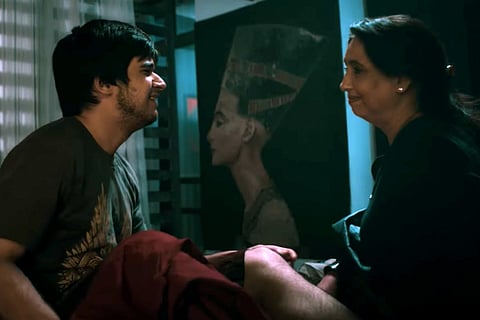
- Reviews
- Power List 2024
- Cannes 2024
- In-Depth Stories
- Web Stories
- News
- FC Lists
- Interviews
- Features
- FC SpecialsFC Specials

Director: Niranjan Iyengar
Cast: Neena Kulkarni, Dino Morea, Vivaan Shah
Niranjan Iyengar, a screenwriter and lyricist, has spent most of his career lending lavish expressions to the Karan Johar universe. His dialogue-writing credits range from Kal Ho Naa Ho and Kabhi Alvida Naa Kehna to We Are Family, Wake Up Sid, My Name Is Khan and Ae Dil Hai Mushkil. Therefore, it's only natural that he inherits some of the "Dharma Productions" motifs in his own directorial work. And it's only appropriate that his short film is titled "Maa" – Mother – an extension of the contemporary-Indian-family formula that many of the company's storytellers exhibit a strong inclination for.
Perhaps calling this a "formula" is a little crude, but the paradoxical voice-vision connect has been somewhat puzzling. There is a lot of honesty and experience and perceptiveness about some of these stories. They are real, occasionally personal and heartfelt, and yet – yet – the makers choose an artistic grammar, a glossy narrative style (omnipresent background score, exaggerated reactions, self-explanatory conversations, taglines), that is tonally at odds with the inherent quietness of these moments. It's hard to lie about your family in these times, but most narrators insist on decorating, and almost diluting, the truth. As a result, even the intimacy of these stories seems a bit distant – as if the directors and writers are too scared to exorcise their own demons in broad daylight.
This film is all about a mother's belated epiphany. It is about her, when it shouldn't be – which is why Iyengar's short has such an interesting perspective. And like many of her kind, she has little understanding about modern-day existentialism and self-loathing and drug abuse; all she wants is for her boy to live, again. All she wants is a solution, irrespective of the cause or the effect
For instance, Maa is a complete tragedy – a gritty, difficult, sapping home situation that most short-filmmakers might have "indie-d" the hell out of. It has a young artist (Vivaan Shah) with a crippling drug problem, a concerned older brother (hello, Dino Morea) and a no-nonsense mother (Neena Kulkarni) who is emblematic of the pitfalls of irrational love. She approaches the predicament as most Indian mothers would – without taking "no" for an answer. And like many of her kind, she has little understanding about modern-day existentialism and self-loathing and drug abuse; all she wants is for her boy to live, again. All she wants is a solution, irrespective of the cause or the effect.
The circumstances are such that any decision she makes is selfless and simultaneously selfish; anything she says is practical and simultaneously ignorant. Iyengar writes this "problem" well. A history is hinted at from fleeting arguments between mother and sons. From Morea's reactions, it is clear that he has grown up enough to make peace with the fact that she is in fact the primary reason his kid brother has flown off the rails. Her neglect ("you were busy with your career, but I'm not blaming you") could be construed as an enforcer of the lost-little-child syndrome. At one point, on seeing his mother merely willing to drag him into treatment, the boy explodes into incoherent spurts. He communicates just about enough to let us imagine that he has pushed himself to the brink of death only to arrest her long-absent attention. To make her notice him. And finally, she has responded, even if it's too late. Now that she has "retired" from a successful career, she has found the time to respond; Kulkarni's performance is convincing, because we sense the shock of a woman who hadn't quite realized the sheer magnitude of the situation. She is, at once, in acceptance and denial.
This film is all about her belated epiphany. It is about her, when it shouldn't be – which is why Iyengar's short has such an interesting perspective. Music is usually used to depict feelings that can't be written for the screen – tension, suspense, melancholia, madness. In the hands of seasoned directors, it is the only distinction between reel and real. But in many cases, as in Maa's, the music is designed as additional dialogue. As letters between the lines. It reiterates what we are meant to read into. The strings sort of unnecessarily fill in the subtle gaps, as if to tell us that this film is about something we aren't used to. Something disturbing, and intense, and rarely spoken about. Which is partly true, given the country this film occupies.
But perhaps a little more trust in the seriousness of the conflict – a conflict that no doubt resonates across cultures behind closed doors – might have elevated it in a way no artificial sounds can. And perhaps then, I'd have been able to independently ask the question – "Are results the only way to define the right and wrong of a decision?" – without being literally told to ask this question by the film.
This final moral-of-the-story-ish slate is an extension of the obvious music. It is supposed to be a sign-off note scribbled at the bottom of the script for potential readers; the screen is no place for written words. It remains the difference between a good director and the right director.
Watch Maa here: